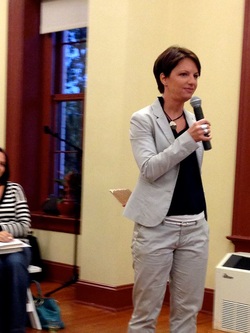 Photo courtesy of Jeremy Meredith
Photo courtesy of Jeremy Meredith Amanda Ripley, a journalist, followed three – to Finland, South Korea, and Poland – for a year in an attempt to determine why other countries consistently outperform the United States in reading, math, and science. What she found informed her first book on education and included much of what we already know: Teacher quality and preparation standards are higher in foreign countries, student assessments more rigorous. But some of what she learned surprised her, too. And that’s what she shared during a talk with YEP-DC’ers Sept. 24.
During her talk, Ripley said the idea for her book, The Smartest Kids in the World — And How They Got That Way, stemmed from frustration over the constant lamenting of the sad state of education in the United States and the pedestal-like nature afforded to top PISA-scorers like Finland. “How do these countries get so smart? And what can we learn from them?” she asked. While Ripley studied data and interviewed experts, she really wanted to hear from students. “You have to talk to kids. They can fill in the holes,” she told the packed room of educators, academics, and advocates at the Hill Center. “They can unravel an entire story in three minutes.”
Kim, who raised $10,000 (and sold a lot of jerky) to escape her rural hometown in Oklahoma, went to Finland to be with the “smartest kids in the world.” Kim noticed almost immediately that Finland isn’t this “test-free, Nordic paradise” that many Americans might envision, but rather a place where assessment quality is valued over quantity.
In South Korea, where Eric studied, schools were “pressure-cooker environments,” Ripley explained. Students attend after-school academies and stay up all night studying, all in an effort to outperform one another on exams. “There are no nerds in South Korea,” Eric told Ripley during one of her visits to Busan. (Ripley didn't elaborate on Tom's story during her discussion, although his story is included in her book.)
Ripley also surveyed hundreds of other exchange students (Americans and foreigners) and found that the observations from her “field agents” were consistent with the survey responses. In the United States, students said that teachers are more likely to praise their students, coursework is easier, technology is more present in classrooms, and there is a stronger emphasis on sports. Overseas, students said school is taken more seriously; “students are connecting the dots between what they’re learning in the classroom and how it makes their lives better,” Ripley said. Also, student success is defined by work done in the classroom, not by performance on the field after school.
Ripley returned to this last point repeatedly during her discussion; she pushed the audience to question America’s “out of balance” emphasis on sports in schools. (This was also the subject of her recent cover story in The Atlantic, “The Case Against High School Sports.”) She says the time and money spent on sports could be spent on academics or (exercise) programs that would benefit more students. It might be hard to imagine an American school without a football or cheerleading program, but is it worth it if students are not developing fundamental skills in reading, math, and science? Would that be enough to make American children the smartest kids in the world?
YEP-DC thanks the Hill Center at the Old Naval Hospital for the space to host this event.
Layla Bonnot is an education policy researcher with a focus on K-12, state-level issues. Reach her via email.

 RSS Feed
RSS Feed